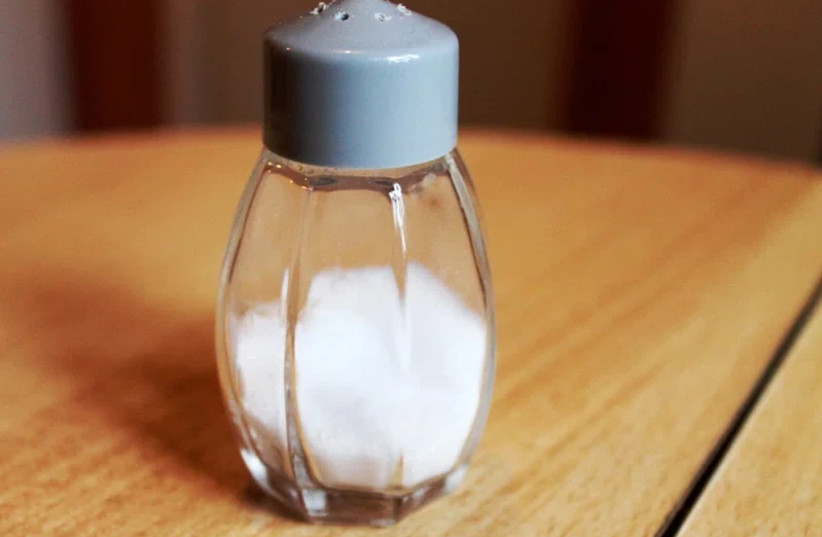Even though food products with excessive amounts of sodium chloride have been marked with red stickers by order of the Health Ministry, a look at supermarket shelves showed that salty products from canned pickles and cold cuts to pretzels and other snacks have a slew of salt. And that’s not counting the amount added to food with your salt shaker.
The effect of dietary sodium on people taking antihypertensive medications is understudied. The estimated daily average sodium intake in middle-aged US adults is 3.5 g, exceeding the World Health Organization, US Department of Health and Human Services, and American Heart Association (AHA) recommendations, and in the prior decade, deaths attributable to excess dietary sodium increased.
Salt consumption in Israel is no less common among adults and children. A national study by the Health Ministry in Jerusalem three years ago found that the consumption of sodium is very high – almost double the recommended amount, at an average of over 9.5 grams of salt per day compared to the recommended five to six grams.
Randomized trials inform recommendations to reduce sodium consumption to lower blood pressure, but individual variability in the BP response to dietary sodium can make determining personalized treatment responses from clinical trials challenging.
Now, US researchers have found that reducing your intake by just one teaspoon a day can lower your systolic blood pressure – the first number of the two that represents the pressure caused by your heart contracting and pushing out blood – and is comparable to the effect achieved with blood pressure medications.

The study, just published in the Journal of the American Medical Association under the title “Blood pressure effects of dietary sodium in middle-aged individuals: a randomized order cross-over trial” and presented at the American Heart Association Scientific Sessions 2023 in Philadelphia, was the first to show that people already on blood- pressure medication could further lower their blood pressure by reducing their sodium intake.
Nearly everyone can lower his/her blood pressure – even people currently on blood pressure-reducing drugs – by lowering their sodium intake, reported the team from Northwestern Medicine in Illinois, Vanderbilt University Medical Center in Tennessee, and the University of Alabama at Birmingham.
“In the study, middle-aged to elderly participants reduced their salt intake by just one teaspoon a day compared with their usual diet. The result was a decline in systolic blood pressure by about six millimeters of mercury (mm Hg), which is comparable to the effect produced by a commonly utilized first-line medication for high blood pressure,” said Prof. Deepak Gupta Vanderbilt co-principal investigator.
“We found that 70% to 75% of all people, regardless of whether they are already on blood pressure medications or not, are likely to see a reduction in their blood pressure if they lower the sodium in their diet,” said co-principal investigator and preventive medicine Prof. Norrina Allen at Northwestern.
This is one of the largest studies to investigate the effect of reducing sodium in the diet on blood pressure including people with hypertension and already on medications.
“We previously didn’t know if people already on blood pressure medication could lower their blood pressure more by reducing their sodium,” said Allen. The total daily sodium intake recommended by the AHA is to be below 1,500 milligrams, and this study was designed to decrease it even lower than that, Allen said. “It can be challenging but reducing your sodium in any amount will be beneficial,” she said.
High blood pressure is the leading cause of chronic illness and death mortality in the world
“High blood pressure can lead to heart failure, heart attacks, and strokes because it puts extra pressure on your arteries,” Allen said. “It affects the heart’s ability to work effectively and pump blood.”
A total of 213 middle-aged to elderly individuals in their 50s to 70s from Birmingham, Alabama, and Chicago were randomized to either a high-sodium diet (2,200 mg per day on top of their usual diet) or low-sodium diet (500 mg in total per day) for one week, after which they crossed over to the opposite diet for one week.
On the day before each study visit, participants wore blood pressure monitors and collected their urine for 24 hours. Among 213 participants, systolic blood pressure was significantly lowered by seven to eight mm Hg when they ate the low-sodium diet compared with the high-sodium diet, and by six mm Hg compared with their usual diet.
Overall, 72% of participants experienced a lowering of their systolic blood pressure on the low-sodium diet compared with their usual diet.
“The effect of reduction in dietary sodium on blood pressure lowering was consistent across nearly all individuals, including those with normal blood pressure, high blood pressure, treated blood pressure, and untreated blood pressure,” Gupta said. “Just as any physical activity is better than none for most people, any sodium reduction from the current usual diet is likely better than none for most people with regards to blood pressure.”
“This reinforces the importance of reduction in dietary sodium intake to help control blood pressure, even among individuals taking medications for hypertension,” Allen added. The blood pressure lowering effect of dietary sodium reduction was achieved rapidly and safely within one week.
“The fact that blood pressure dropped so significantly in just one week and was well tolerated is important and emphasizes the potential public health impact of dietary sodium reduction in the population, given that high blood pressure is such a huge health issue worldwide,” said co-investigator Dr. Cora Lewis, professor and chair of the department of epidemiology and professor of medicine at the University of Alabama.
“It is particularly exciting that the products we used in the low-sodium diet are generally available, so people have a real shot at improving their health through improving their diet in this way,” Lewis concluded.
